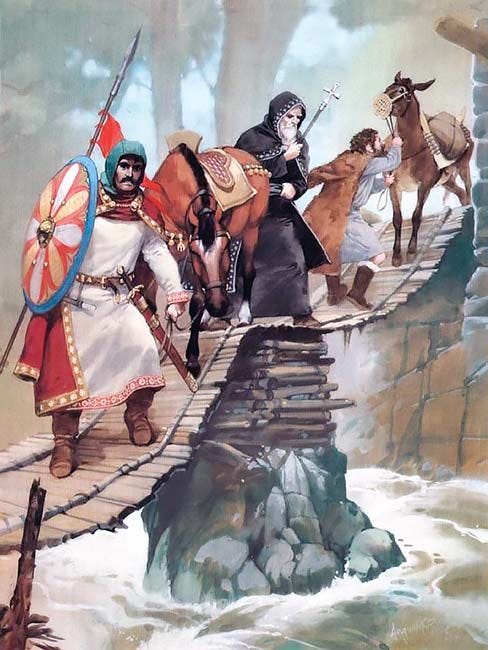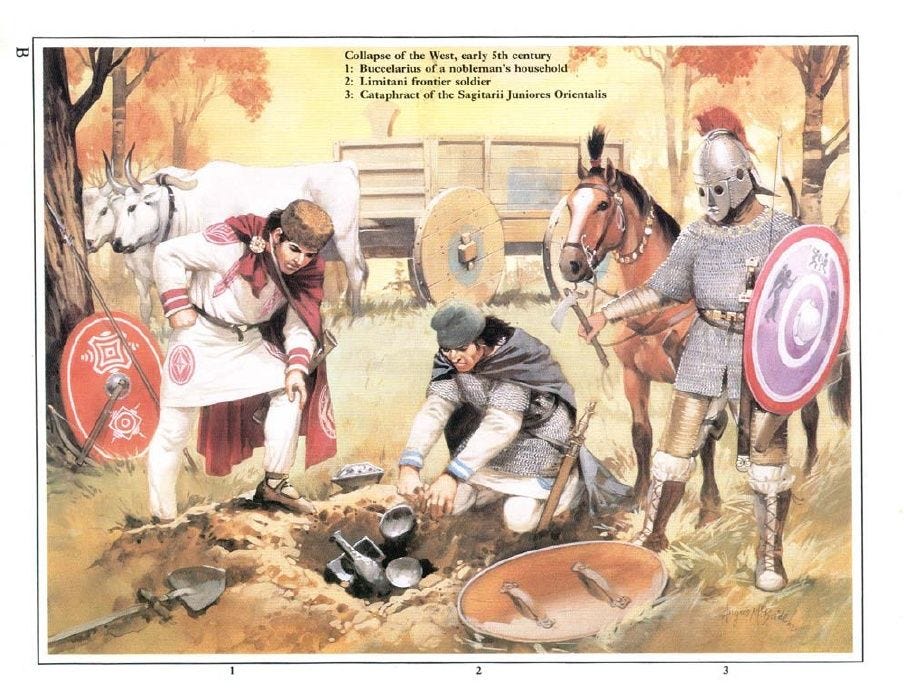This began as one of my 'Fall' posts about 'Cults of 5th Century Rome, which I rapidly discovered I could not write as I don't actually know anything about 5th Century Rome, and then later because I realised I found 8th Century Rome more interesting.
So instead this is more of an "open post", discussing some of the possibilities for a game or story set in Rome during its nadir, and asking the readers if anyone out there actually knows anything about this period in history.
DREAM OF A DARK DETECTIVE
The population graph of Rome over history tells the story better than I could;
an extremely, even unnaturally for the time, dense and highly populous city declining into a smallish town, leaving its stones and tenements to moulder.
Based purely on population it stays this way through the entire middle ages, only leaping into action again as we approach the modern era.
But even during this Nadir there was quite a lot going on in Rome. It was still the seat of the Western Christian Church, (some of the time), and while its population was relatively small, it never disappeared.
I've always loved this liminal period of European history, especially notable in Britian, and I couldn't stop thinking of some kind of ancient detective story set in fallen Rome, of a Knight or Investigator sent out into the grass-filled ruins and down into the Crypts to deal with the freaks and oddities which, at least theoretically, might have been hanging out there.
It is a lot of very dense, overgrown, largely empty, ruined and available property. Really a great place to set up shop if you are a cult or criminal gang, so much that you might almost want to start a cult just so you could hang out in the ruins of Rome, being weird.
The Silentiary
The Silentiary, ("Silentiarius, silentiarios), was a Byzantine Court post. Originally it seems to have been a job of keeping all the nobles and petitioners in the Imperial court in order, and then later was transformed into an honorific of its own.
I learned of the role through the strange name of "John the Silentiary" a Byzantine court agent who played some important role in the fate of Rome in the mid 8th century.
It’s a general idea of mine to that to create a Detective, first build a world of social layers, factions, racial groups, ideals and religions, and when you look down through the stacked Venn diagram of all these different groups, find the part where as many overlap as possible, and make your Detective right there, stuck in the middle of everything. Make sure they have enough putative authority to walk into the homes of rich and poor, but nowhere near enough to guarantee they can get what they want. They need a ritual, neutral role, something socially protected, but not one that can afford its own range of patronage.
The Silentiary is a curious ritual role from a foreign court, one of the "Bearded Classes", (i.e. not a eunuch), though it could be amongst the lowest official roles, and could be awarded honour-ily, presumably for notable or useful deeds. They seem to make a perfect detective, a Silentiary of the Ruins, or Silentium Ruinarum.
But what cults or mysteries will they be investigating? Here things get difficult! If we assume a period for the Detective Stories around the middle part of the 8th Century, before Byzantium is driven out of Italy by the Lombards, it might be a little like this;
Some ideas for cults;
> Local Powers
Islam - A surprisingly big chunk of southern France is under Islamic control up until the mid 8thC. What could be more Lovecraftian for a Catholic Roman Italian than sneaking through the ruins and discovering... Secret Muslims!
Germanic Wotanism - At the same time the Lombards are currently ruling northern Italy, and I think are still Germanic Pagans. The Franks are Christianised, but how Christian are they really? There must be some hold outs and crypto-Wotanists. Native post-classical Pagnism is one thing but what if the Goatherds find a Blood Eagle in the Temple of Jupiter. Secret Germans? Or is someone trying to throw you off the scent.
> Christian Cults - The Heresies
There are SO MANY fragments of early Christianity that get banned or ejected; Arianism, Docetism, Ebionites, Gnosticism, Marcionism, Montanism, Trinitarianism. I barely know a damn thing about any of them.
"Sethian - Belief that the snake in the Garden of Eden (Satan) was an agent of the true God and brought knowledge of truth to man via the fall of man."
"Ophites - Belief that the serpent who tempted Adam and Eve was a hero and that the God who forbade Adam and Eve to eat from the tree of knowledge is the enemy."
Finding secret heretical Christians lacks the Elevator-Pitch high concept energy of secret Muslims but is a lot more likely and probably just as upsetting for the authorities of the time.
There were also "The Cults of the Martyrs" and "The Cults of the Saints", though I know nothing about either of these or if they even match my requirements for cults.
> Surviving Roman Paganism
Julian the Apostate died in 363, so a looong time ago relative to our story, but who knows, maybe some remnants of the Senatorial classes, or one of the families of Rome, or some shady Bishop, or just local people, maintain some form of Classical Paganism. The most likely are the actual Gods of Rome, (there must be statues about), Isis Worship and the Mythratic Cults, who, tbh, would really love hanging out in mysterious ruins.
> Byzantine Crypto-Paganism
The Empire still stands after all, and the great texts and ancient knowledge of Rome still exists, just not here.
An interesting thing about Byzantine Crypto-Paganism is how modern it feels. Courtiers and Bishop are being accused of Crypto-Paganism in 7th Century Byzantium and 600 years after that, Gemistos Plethon writes a book recommending a return to some form of Platonism.
Instead of being a weird superstition, here the moral and philosophical challenge is coming from _within the texts themselves_. You can't just un-write Plato and it looks like there was some kind of weird undercurrent in Byzantine thought that maybe questioned this whole Christianity thing and was a bit too interested in the Old Books.
Secret Platonists in the ruins! A plot of intellectual elites driven by a search for truth.
> Satanism
It’s a classic for a reason. I think even the medieval idea of Satan hadn't taken shape by the 8thC but a belief in the Devil and in Magical Powers and Demonology and Witchcraft more generally kind of tugs along in the undertow of Christianity by the middle middle ages, driven by people like Clerks, Alchemists and overeducated oddities.
Our Silentium could run into the first hot new actual Satanists! Imagine being the first guys to work that one out!
And of course, not to forget the European Classic;
> Jews
Because it wouldn’t be a European conspiracy story if there weren’t Jews in the tunnels.
Queen Mab’s Palace is getting made! We are heading for a painted cover!









